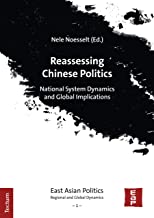External publications

Nudging with Chinese characteristics: an adapted approach from the Global North to achieve a sustainable future?
Hägele, RamonaExternal Publications (2019)
in: Nele Noesselt (ed.), Reassessing Chinese politics: national system dynamics and global implications, Baden-Baden: Tectum Wissenschaftsverl., 172-199
ISBN: 978-3-8288-4325-7
Information
China draws on behavioral insights and Nudge Theory to implement its respective environmental policies. The government mainly uses social and informational nudges, voluntary incentives, framing and simplification, as well as combinations of traditional governance intervention tools to formulate and implement its various policies in this field. The outputs of the applied behavioral insights and nudge-based environmental policies are predominantly voluntary incentives and the provision of information aiming to change the behavior of individuals. So far, incentives on low-carbon products—for example electric vehicles, emission-trading schemes, and grant awards to individuals for outstanding achievements in environmental protection, as well as informational nudges—have contributed to increased green awareness, public participation, and greater public trust. Moreover, it has been found that China intends to meet the SDGs of the 2030 Agenda specifically by building an ecological civilization. Special focus herein is drawn to individual behavior, since everyone can contribute to implementing and realizing the Agenda’s goals. Nevertheless, the Chinese leadership still predominately calls on traditional governance intervention tools (namely authority) such as command-and-control regulations. If behavior does not conform to the stipulated regulations, then sanctions will be imposed—a demonstration of the government’s use of nudging with Chinese characteristics. Although China still faces challenges to meet the 2030 Agenda, the country has nevertheless made remarkable progress in its recent environmental policies. The transformation thereof, alongside the aspiration to construct an ecological civilization, reveals China’s commitment and genuine intention to protect the environment while pursuing economic and social progress. The use of behavioral insights and Nudge Theory is compatible with the aimed for socialist modernization with Chinese characteristics. Bridging traditional cultural values with contemporary Behavioral Science practices, could lead to China assuming a pioneering role on the environment globally. In any case, it has already gained an international energy and climate leadership role with the withdrawal of the US from the Paris Agreement.
Contact
Cornelia Hornschild
Publication Coordinator
E-mail Cornelia.Hornschild@idos-research.de
Phone +49 (0)228 94927-135
Fax +49 (0)228 94927-130
Alexandra Fante
Librarian/ Open Access Coordinator
E-Mail Alexandra.Fante@idos-research.de
Telefon +49 (0)228 94927-321
Fax +49 (0)228 94927-130



![[Translate to English:] Photo: Alexandra Fante, Bibliothekarin/Open Access-Koordinatorin](/fileadmin/_processed_/f/0/csm__c_Deutsches-Institut-fuer-Entwicklungspolitik_Fante_94ce4fa1ba.jpg)